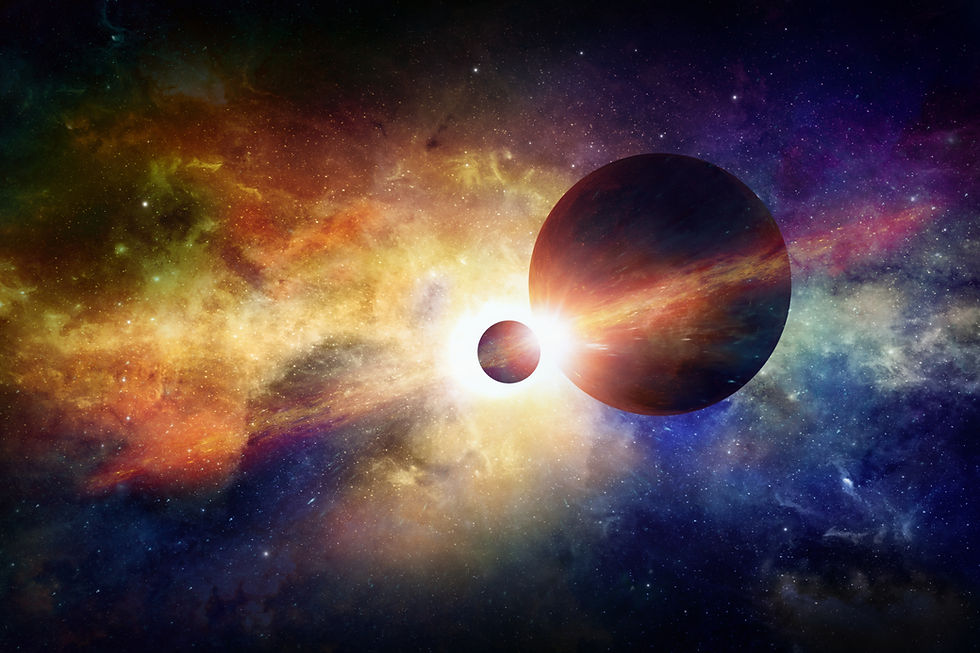Can a Full Moon Affect Your Mood?
- A Zyn Space

- Nov 8, 2022
- 4 min read

Does the Moon Make People Crazy?
By: Tim Clark
Does the Moon influence our behavior or emotions? There’s never been solid proof, but there’s some new evidence suggesting that the Moon can affect sleep—and it doesn’t matter whether you’re in the country or the city! Let’s explore the myths and reality of the Moon’s power.
The Luna-Lunacy Connection
Ancient authorities like Aristotle, Paracelsus, and Pliny the Elder thought some humans were driven crazy by the full Moon. The Latin name for the Moon—luna—is the root of modern words like “lunacy,” “lunatic,” and even “loon,” as in “crazy as a loon.”
Even today, many doctors, nurses, EMTs, police officers, and elementary school teachers agree that full Moons will bring out bizarre behavior—43 percent of healthcare professionals believe in what some call “the lunar influence,” as do 81 percent of mental healthcare specialists. But is there really a lunar connection to abnormal behavior?
Unless you plan to ask a werewolf (which we don’t recommend), it might be time to separate facts from fiction.
The Moon and Sleep
According to one scientific study conducted in 2021, people go to bed later and sleep for a shorter period of time in the days leading up to a full Moon. Specifically, people would go to bed 30 minutes later than average and sleep almost an hour less per night!
This makes some sense because the light from the Moon after sunset is brighter on the days leading up to a full Moon. However, here’s the surprising part: Studies found that it didn’t matter if you lived in a rural or urban environment (where you might find more light pollution). Sleep patterns were compared between people in two very different locations:
Indigenous people in rural Argentina (the Toba/Qom communities) who don’t have any access to artificial light
College students living in downtown Seattle, Washington, where the glare from city lights dims the light from the Moon and stars.
If the Moon’s brightness isn’t a factor, why do we stay up later and sleep less? One theory goes back to our ancestors and our long history before the industrial age. People paid attention to the Moon and relied on its “night light” for hunting, fishing, and other social activities. Think of the “Harvest Moon” in the autumn, so-named because it provided several nights of light for farmers to gather in their crops at the height of harvest. Every month, the nights leading up to a full Moon bring more light to the evening.
Our sleeping patterns are controlled by our natural circadian rhythms— the day and night cycles driven by Earth orbiting the Sun. But there are also circalunar rhythms, which are tied to lunar cycles. Certainly, some animals will respond to both a circadian rhythm and a lunar clock.
Many animal species’ behaviors are influenced by the Moon, too. Think of birds that rely on the Moon for migration and that will even time their reproduction to coincide with the specific phases of the lunar cycle.
Anecdotally, you have to wonder if less sleep (whether interrupted sleep or going to bed later) for several nights in a row might lead to some irritability—and what you might call moodiness!
The Moon and Lunacy
That leads us to weird behavior. There have been hundreds of studies about the Moon and lunacy. The few studies that suggest a connection are usually disproved or contradicted by others:
One study says more animal bites (from cats, rats, dogs, horses) occur at the full Moon; another says there’s no increase in dog bites.
One shows an increase in crime around the full Moon; others find no increase in arrests, calls for police assistance, prison assaults, batteries, or homicides.
Admissions for psychosis are lowest during the full Moon, and psychiatric emergency room visits decline; but calls to suicide prevention hotlines peak at the new Moon, not the full Moon.
We’re not quite sure how you’d actually prove the connection between the Moon and lunacy. But one explanation might be what psychologists call “confirmation bias.” In other words, people are more likely to notice things that confirm a preexisting belief.
If you’re working in an emergency room, and something weird happens on the full Moon, your older and wiser colleagues nod and say, “Must be a full Moon.” That’s what they heard from their elders when they were new at the job. (Psychologists have a name for that, too: “communal reinforcement.”)
But if something weird happens at a different phase of the lunar cycle, nobody says, “Must be the third quarter Moon!” And when nothing unusual happens on the full Moon, nobody says anything
We call widespread beliefs that are unsupported by fact “folklore.” Erika Brady, who teaches folklore at Western Kentucky University, says, “it’s a way of imposing order on something that feels frighteningly out of control.”
How does a belief that strange things happen on the full Moon help us feel safer? The full Moon occurs only once every 29.5 days; that means the other four weeks of the lunar month should be less dangerous and unpredictable.
Therefore, this folk belief implies that our fears about everything from increased bleeding to werewolves may be limited to only 12 or 13 days per year. (Maybe that’s why the number 13 worries people!)
What do you think about the Moon? Does it influence behavior or emotions? Or, is it all in our imagination—and our dreams?



Comments